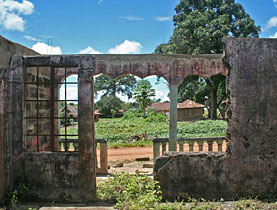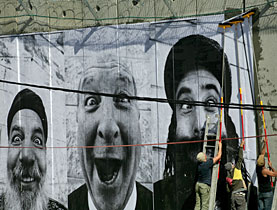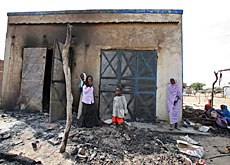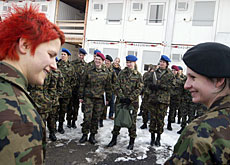Raising the voices of war victims

Myrna Mack, a prominent Guatemalan anthropologist, was assassinated in September 1990 by a military death squad in Guatemala City.
Eighteen years later her younger sister has spoken in the Swiss capital, Bern, of the challenges – and frustrations – she has faced in pursuing justice over the murder of her sister.
Shortly before her death, Myrna Mack had been conducting research in politically sensitive areas. Her 1990 publication, which detailed the disposession of indigenous communities, was critical of authorities.
She died after being stabbed 27 times.
Her case symbolises much of what went wrong during the Central American country’s 36-year civil war, in which some 200,000 people – the vast majority of whom were Maya Indians – were killed.
Guatemala’s Historical Clarification Commission concluded in 1999 and declared that the government had committed genocide.
Helen Mack was a speaker at a justice and human rights forum organised by the Swiss foreign ministry in early March.
“I was asking the right to understand why my sister was killed. And I was asking for my right to justice,” she told swissinfo.
Transitional justice
The practice of rehabilitating societies after they have undergone traumatic conflict – known as transitional justice – is a primary Swiss foreign policy objective.
Dealing with a legacy of human rights violations is one of the most difficult challenges facing societies in transition from authoritarian regimes to more democratic forms of government.
To re-establish fundamental trust and accountability in society, experience has shown that there is a need to acknowledge publicly the abuses which have taken place, to hold responsible those who have planned, ordered and committed such violations, and to rehabilitate and compensate victims, according to the Swiss government.
It is seeking to deliver a clear message that transitional justice and dealing with the past are essential, a senior foreign ministry advisor, Mô Bleeker, told swissinfo.
The foreign ministry operates peace programmes in countries including Burundi and Nepal, and has a large presence in Guatemala.
Swiss experts support governments, civil society and other local actors to organise investigation commissions, judicial processes, reparations for victims and institutional reforms.
It has become an international obligation to prosecute the authors of serious human rights abuses, Bleeker argues. By supporting locally and internationally the rule of law and instruments of accountability, the international community makes its concern clear.
Lost ground
Despite a series of international conventions signed and ratified by governments around the world, multilateral agreements are often not accompanied by concrete action and have failed to prevent some of the worst human rights violations.
Since the end of the Second World War, civil conflicts have ravaged parts of Africa. In addition, regimes in Latin America, Asia and the Balkans have acted with disregard for the international community, and political actors who oversee rights violations are often let off easily if not actually rewarded.
According to Yasmin Sooka, victims have the right to demand that states take action against transgressors, but she admits that for the victims, human rights are “meaningless” if they cannot be enforced.
Disenchantment
Helen Mack says she is disenchanted with the immunity agreements for political and military leaders that have accompanied the peace process in Guatemala.
“You cannot talk about justice if you have had impunity since the beginning,” she said.
Mandira Sharma, a Nepalese human rights activist, is worried about possible impunity in Nepal where peace agreements were signed last year. She criticises the fact that in many peace processes, the voices of the largest constituency – victims – are conspicuously absent.
She told swissinfo that the role of the international community, civil society and human rights organisations is to build momentum so that the voices of victims will be heard.
swissinfo, Justin Häne
Based on academic definitions, there have been around 40 civil wars on four continents in the past ten years.
Some human rights practitioners make a distinction between “positive peace” and “negative peace”. The latter, they say, means that there is simply an absence of violence. Positive peace can only occur when the conditions that foster violence have been eliminated.
Experts point to the recent violence in Kenya to highlight this theory. While the country had been considered one of the most stable and advanced on the continent, longstanding tribal animosities still existed and quickly erupted into violence.

In compliance with the JTI standards
More: SWI swissinfo.ch certified by the Journalism Trust Initiative



You can find an overview of ongoing debates with our journalists here . Please join us!
If you want to start a conversation about a topic raised in this article or want to report factual errors, email us at english@swissinfo.ch.